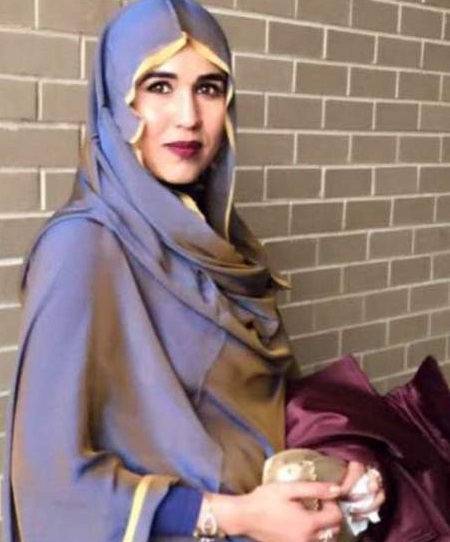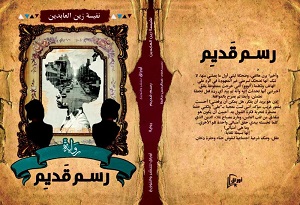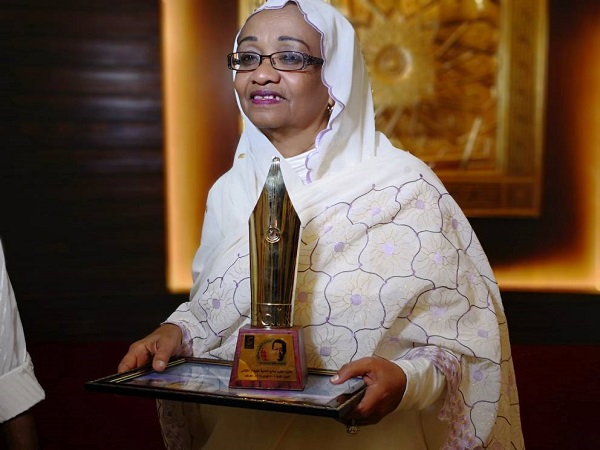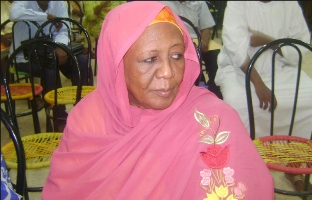'Old Drawing' Author: Writers In Our Country Are Honoured After They Die
25 February, 2018
KHARTOUM (Sudanow) -Novelist and story writer Nafisa Zain al-Abidin is a Sudanese immigrant who lives in the United States of America. Her novel “Old Drawing” caused a stir among critics and readers because of the silenced social issues it raised. She published the story collection “Elegant Sins”. She holds a BA’s degree in Arabic Language from the University of Wadi El-Nile in Sudan and is currently undergoing Master’s studies of Linguistics at North-Western University in Chicago. She has many writings and translations on women, society and life.
THE INTERVIEW:
Q: The female self was able, within the explosion of novel writing, to find its adequate emplacement within the narration structure, what is the emplacement of writing for you?
A- For me, writing is my relationship with myself, which I know and I still discover through what I write. There are aspects of my personality that I only discovered through writing. There are other aspects that I know but cannot approach if not through the power of writing, which means that writing has organized my personality and deconstructed my complexes and offered me psychological stability.
Q: The novel has spectacularly spread. Does this contribute to place it within the framework of knowledge that contributes to the literary renaissance in the world?
A- It has recently been reported that we live in the age of the novel and that the latter is the “Register” of Arabs. There is no doubt that the spread of the novel contributes to its own development, which enriches the literary scene, but it is not enough to make a global literary renaissance.
Q: “Old Drawing” is a realistic novel that has been able to portray a whole society. What is the “New Drawing”?
- “Old Drawing” was well accepted by those who have read it perhaps because it portrayed, as you said, the features of a society we live in with its problems, places, and personalities with whom we may live under the same roof. The drawing so far is multi-headlined, its idea is different and I consider it distinctive.
Q: You immigrated to America after your high studies, how is the relationship between the American culture and the Sudanese culture in the light of the existing difference?
A- My culture is still mostly Sudanese and Arab, but difference is a rich experience that makes you discover yourself and your abilities more. American culture helped me in many ways and added to my personality a number of positive features, such as discipline and self-reliance - which our culture often lacks - and also unconditional ambition. Here you can reach your goals; you only have to be willing. American culture also served me to remain faithful to my identity and I became better than I was in my relationship with existence and with people.


Q: Reading “Old Drawing” opens multiple doors in the realistic narration; don’t you fear the next novel?
A- Not at all, I always write for my own gratification, and I have always loved to read the writings that seek to expose reality impartially. These writings were beneficial to me and offered me lessons in life, especially in my adolescence. Hence, “Old Drawing” came as a natural result of my multiple readings about issues that people may not like to mention or remember much.
Q: The novel discussed the issue of spinsterhood.
A- The spinsterhood in our country, extended to the country of exile, is a reality that pushed me to adhere to realism in the novel “Old Drawing”. “The Elegant Sins” is also a story in which I dealt in some parts of it with bold reality because I saw that it is necessary to voice some negative aspects that are beautified and considered positively, thus affecting the psyche of some people. Realism in narration is, as Muhammad Khudair put it in his work “Narration and Book”, the virtual possibility of making a visual version of an invisible copy, resisting mysterious references, opening a closed door that is the double door of truth, reality of the real, and reality of the narrative, a permanent search in the unknown.
Q: What are the social, ideological and cultural influences on your writings?
A- I am influenced by the local and global reality we live in. I look for justice and honesty in communication between people and I miss that time when the Sudanese society was better than now in all aspects of life. Ideologically, I write about everything that stirs my convictions and principles. Culturally, my writings are usually influenced by my readings and I do not write only for myself. There is a novel I have not published yet and I think about publishing soon.
Q: What are the features of this novel that has not been published?
A- The migration of the nomads to the north of Sudan during the seasons of collecting dates affected me. I wrote about their dreams, aspirations and the simple life they live. I lived with them for weeks in a house owned by my grandmother's family. In that house, many families lived and they had daughters more or less of my age at that time. I went out with them to collect dates. I heard their stories at the end of the day and cried when they had to leave to their homes with promises to meet the following season. The impact of all this on my writings is great. In my memory there are still many images that need to be translated into a novel or a collection of stories…
Q: Critics believe that novels written by women express better women’s selves. Do you agree on this?
A- Women can draw their inner self with exactitude. Therefore, in my opinion, literature that deals with the feelings of women is more honest and more influential when it is written by women because the description is then not just imagined or presumed or improvised.


Q: The short story has fallen to the forefront, why? Can we say that dealing with the novel as a historical document is the cause of the decline of the short story and the reason why it is considered a transitional phenomenon between the story and the novel?
A- The short story is a literary genre with rules and bases that make of it an independent genre. In my opinion, it is no longer that brilliant because its popularity linked to newspapers in the past is reduced and because of the prevailing of the novel now. The decline of the short story is also the result of recent changes in the literature market.
Q: What are the changes that took place in literature?
A- Literature industry has its own investors who are the publishers. The latter prefer the novel mainly because of its financial advantages. Besides, the novel awards make the novel more demanded for the profits it can provide compared to the short story which is controlled by the newspapers even in the number of words.
Q: What do you want to say in your story collection “Elegant Sins”?
A- “Elegant Sins” is a group of stories that discuss sins that we may commit out of love, custom, tradition, egoism, ambition that does not care about morality rules, boredom, revenge, and other acts that are considered sins but not socially questioned, and often recognized and made easy to happen. They are sins that have worn the dress of acceptance in societies that are unaware of the fact that they are not -elegant- sins.
Q: What is the difference between living in the Sudanese Arab-African society and the open American society?
A- The difference lies in the nature of experiences lived by the immigrant writers and reflected in their writings. The open society puts you in front of a moment of free choice, in which you decide who you are and what you write. While in Sudanese and Arab societies freedom of expression is restricted, and even confiscated it if it is opposing. The American society also encourages creative persons and tries to develop their abilities, and even if they do not succeed, they are offered many good opportunities for success unlike our Sudanese and Arab society.
Q: In relation with the phenomenon of attacks on the foreigners (fight on terrorism phobia) and all that we watch on the screens, does the immigrant writer feel safe within the community he/she lives in?
A- I think that safety lacks even in our Arab and Muslim societies. Terrorism is not just carrying weapons and blowing innocent people. What we see on screens may render the other afraid of us as Muslim immigrants in the present and in the near future. But what is happening in the Arab region scares us from the near and far future.

Q: You have experienced translation, what can you say about the translated text as it moves from a cultural context to another one?
A- There is a saying that assumes that if the writer makes a national literature, then translation makes global literature. The translated literary text seems to be smooth and acceptable if it carries the spirit of the text and not just a literal translation of the words. Literal translation fails to convey the meaning and makes the text translated incomprehensible. In my opinion, free translation erases the differences that might complicate the transition of the text into other terms in literary translation, the letter kills and the spirit gives life as Voltaire said.
Q: The writer mother?
A- I am a mother and a writer. I can describe how huge is the sacrifice when I imprison a strong desire to write because I have to perform more important tasks than my text or idea. But even so, I am active in writing. Some may take women writer's attention to their families as a result of their lack of concern and concentration on writing.
Q: Doesn't this affect their relation with the act of writing and with the society?
A- Melissa Holden wrote in an article that the reason for this impression is that the woman writer cares about her family first and then comes her interest in writing as a secondary matter in her life. Holden denied the writer's lack of seriousness in writing and gave herself as an example for whom writing comes in the first place and her family understands it and appreciates it. Although some women writers have more responsibilities and burdens than men writers, but this does not prevent their dedication to writing. The mother writer is undoubtedly great and deserves respect because she writes despite her other responsibilities as mother and writer.
Q: Creativity within the American society is different as the immigrant writer lives with nostalgia for his/her original community, and is known in his community and unknown there?
A- Creativity itself may not differ much. Writing is a free act of absolute identity. The difference may lie in the very feelings of the writer. In addition to his/her constant nostalgia for the distant homeland, they are absent from the literary platforms and from participation in cultural events and gradations in positions they might deserve. They also might lose their chance in local honouring, but they should not worry about this last point because honouring writers usually takes place after their departure to the other world.
E N D
MN/AS









Comment
Hashem E Mohieldin
25 February, 2018I really appreciate what you brought to us here. Moreover, iam influenced by this great converation where our AUTHOR Nafisa Zain al-abidin could be seen as a great writer, when viewed from different angles. Being a sudanese will never mean reacting emotionally to the author. It does not mean we are not emotional. It simply means she is pround of herself and her roots. She reasons out things and apply logic and experiences to them. The most noticable fact that showed by Nafisa is that : We are all the product of our conditioning.
Hamid Sharfi
25 February, 2018It is very interesting and a touching interview. I enjoyed reading it.
Mohsin basha
25 February, 2018Well done Nafisa Today, terrorism has no identity or religion or country the terrors in Western schools is beyond our understanding Why it’s happening??? Kids ask
Ahmed Sharfi
28 February, 2018Very Well Phrased, the topic of cultural identity in a foreign land I also think is a very overlooked topic and it's nice to see it being emphasized.
ReadingBeast
28 February, 2018I read both books, they are very good????????